There is something quietly powerful about small business networking. It is actually where the best business moves start. And the people who make the most of it don’t follow the safe formula. They cheat it a little. They skip the “polished pitch” and show up messy but interesting. They just know how to bypass the small talk and get straight to what people remember.
And if you want to be that person, you need to give up the usual. The usual gets you average. That is why we have compiled this list of small business networking hacks. Not the ones everyone repeats. The ones people quietly use to get ahead. Steal them. Twist them. Make them yours. Just don’t do what everyone else is doing.
10 Small Business Networking Hacks You Should Start Using Today
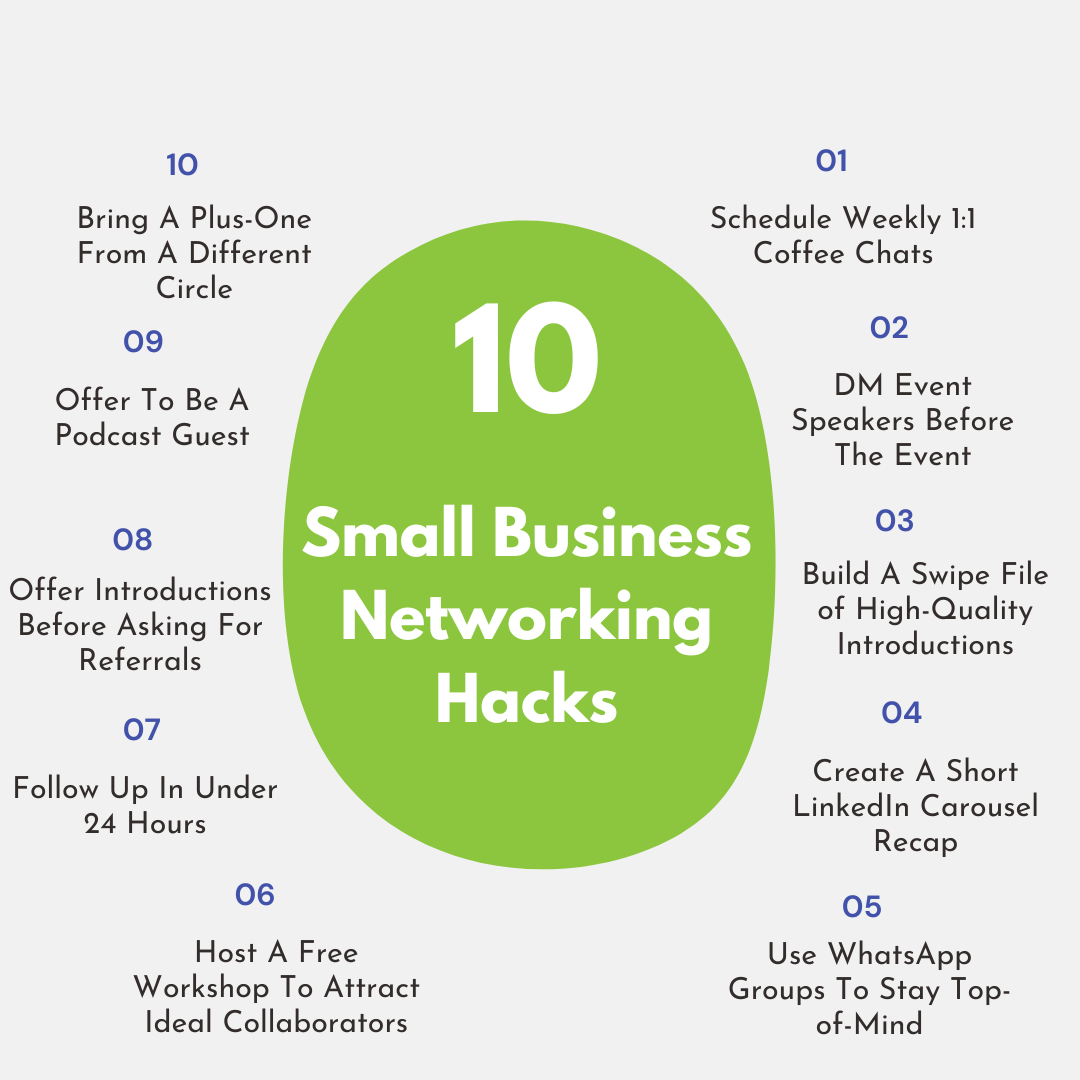
A few smart tweaks can make networking way easier and actually useful. Here are 10 hacks you will wish you started using sooner.
1. Schedule Weekly 1:1 Coffee Chats With Local Founders
A packed calendar full of events is no good. You need one real conversation a week with someone who understands it. Start scheduling one-on-one coffee chats with local founders or small business owners in your area.
Here’s how to do it:
- Pick one day a week that you will reserve for this. Fridays are great because people are generally more relaxed.
- Reach out casually: “Hey, I’ve been connecting with other local founders for short coffee catchups each week – down for one sometime soon?”
- Keep it short and low-pressure. Suggest 30 minutes max. If it goes longer, great. If not, no stress.
- You don’t need a deep agenda. Just talk shop and swap stories.
Not every powerful connection is made in a co-working space or on Zoom. Some of the best business conversations happen when you are not in “business mode.” That is why a growing number of small business owners are using unusual meetup places for real networking opportunities.
One interesting shift that is quietly happening is that founders are networking in outdoor saunas. Simple, wood-fired spots in the woods or beside cabins, where you sweat out the stress and swap real stories.
And it is easy to see why. There is something about stepping outside of a traditional setting that lets people drop the pitch and actually talk like humans. There is no pressure to “perform.” And you hear different things when you are not trying to impress. People open up more when you are both out of context.
So if you have been stuck on traditional formats, maybe the next big connection won’t come from a networking app or an event hall, but from a Saturday in the woods, saying less but learning more.
2. DM Event Speakers Before The Event To Build Rapport Early
Most people wait until after a talk to approach the speaker, when 30 other people are already lined up. But if you want to stand out, connect before the event.
Here’s what to do:
- Find out who is speaking. Look them up on LinkedIn, Twitter, or wherever they’re active.
- Send a short message a few days before:
“Hey [Name], saw you’re speaking at [Event Name]. Pumped for your session — your post on [topic] really stuck with me. Looking forward to catching it live.”
Don’t pitch anything. Just create a touchpoint. Most speakers remember the people who reach out early (because almost no one does).
Bonus move: After their talk, reply or comment again. “Killer session – really appreciated your take on [specific insight].” Now you are a familiar face with context.
3. Build A Swipe File of High-Quality Introductions & Use Them Generously
This is a strong long-term strategy. Start building a swipe file of thoughtful, well-written intro templates you can reuse – a simple Notion doc, Google Doc, email draft. People remember the ones who connect them with great people. It builds social capital fast and quietly.
Here’s what to include:
- A template for intro’ing two people who should meet.
- A version for recommending someone for a podcast or panel.
- A blurb that works as your own self-intro when someone asks, “Mind sending me something I can forward?”
4. Create A Short LinkedIn Carousel Recap After Each Meetup
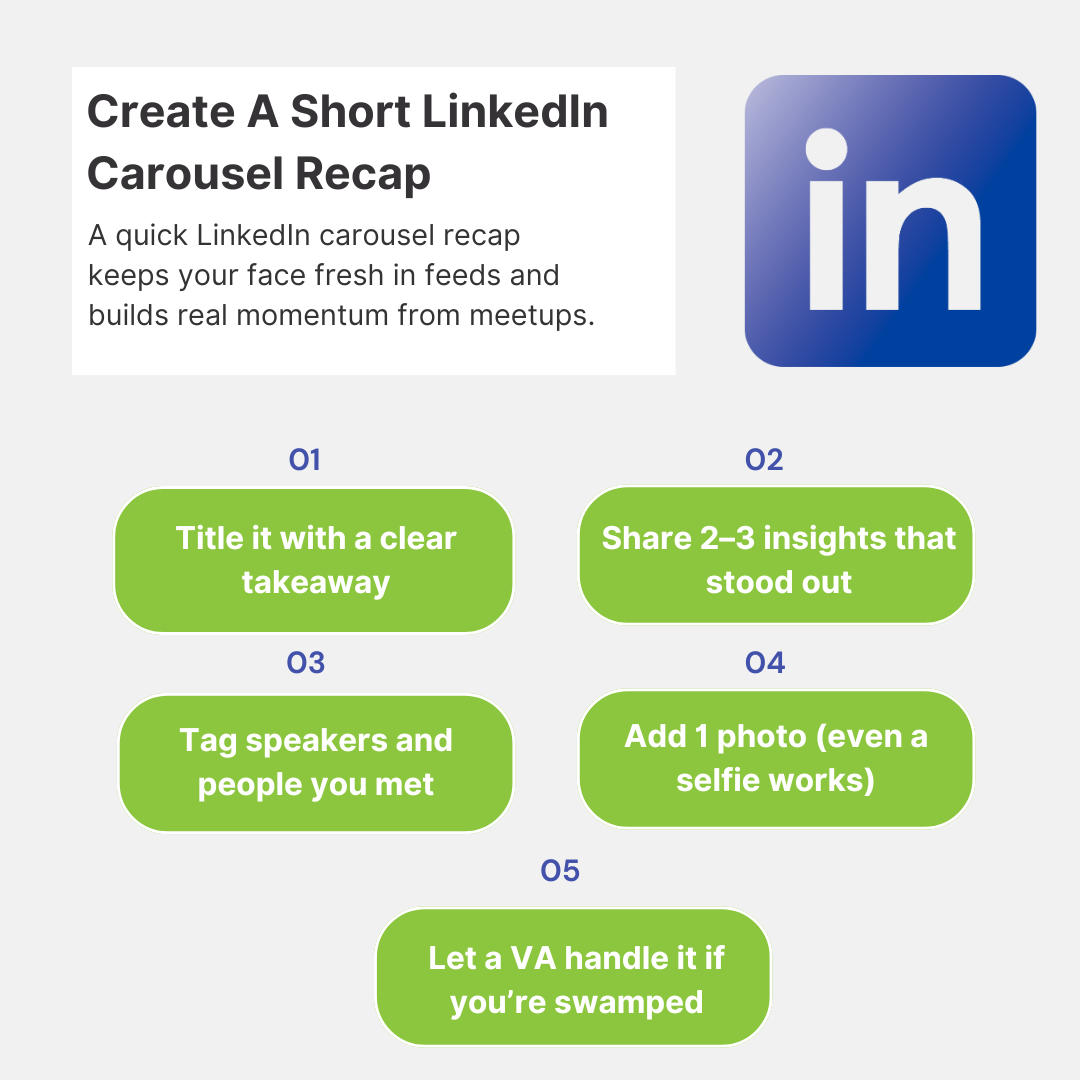
Most people go to meetups and quietly fade into the background after. But you are going to keep the momentum going by being the person who shows up online, too. It keeps your name fresh in people’s feeds right after they have seen you in real life.
After a meetup, make a quick LinkedIn post. Use a carousel (multiple slides) to highlight:
- What the event was
- 2-3 insights you liked
- A thank-you shout-out to speakers or people you met
- One casual photo (even a selfie or crowd shot works)
Structure it like this:
- Slide 1: Title – “3 Things I Took Away From [Event Name]”
- Slide 2-4: Key insights, takeaways, moments
- Slide 5: “Grateful to connect with so many small business owners – drop a comment if you were there!”
Now, the idea of keeping up with this kind of post-event visibility can feel like one more thing on your already packed list. But this is exactly the type of task you can delegate. And for this, you can hire a virtual assistant who can quietly save your whole rhythm. It is one of the easiest, most practical upgrades you can make to your networking strategy.
And you don’t need them full-time. You just need someone part-time who can turn your scribbled event notes into a polished LinkedIn post and draft a few email follow-ups, or maybe even track who you met and what was discussed. All the things that make networking work but tend to get pushed aside when the day-to-day kicks back in.
5. Use WhatsApp Groups To Stay Top-of-Mind With Attendees
Everyone loves the idea of “staying in touch” after an event, but it rarely happens. WhatsApp groups make it easy to keep the energy going without constant 1-on-1s.
Here’s how to use it well:
- If the event has an official group, jump in and contribute something valuable right away. Not “great event!” – actually useful stuff. A tool, a link, a relevant insight.
- If there is no group, start one. Say, “Hey, I met a bunch of amazing people tonight – anyone down to keep the conversation going? I can start a casual WhatsApp group if that helps.”
Pro tip: Don’t overdo it. One message a week is plenty. Share an event invite or something someone in the group is doing. Make it feel like a group you would want to be in.
6. Host A Free Workshop To Attract & Connect With Ideal Collaborators
You don’t need a big following or fancy event space to do this. All you need is a topic you know well and a reason for people to show up.
Here’s how to do it without overcomplicating:
- Pick a topic that speaks to your niche (but has wide appeal). Example: “How I Grew My Local Product Sales Without Ads” or “What I’d Do If I Were Starting My Business From Scratch Today.”
- Use Zoom or a co-working space for an in-person version. Keep it simple.
- Invite 15-20 people max. Post in Facebook groups, WhatsApp chats, Slack communities, and DM past event contacts.
- Use a free Canva graphic and post it to LinkedIn/Instagram stories with a link.
Now, this isn’t only great if you are looking to network with fellow owners. It works equally well when you are looking to fill a role yourself. Say, you are finally ready to bring on a financial analyst to help clean up your books or model growth properly.
A short, simple workshop is one of the easiest ways to attract that kind of talent without blasting out job posts or going through three rounds of hiring calls. Someone in your workshop might be the right fit, or they might know someone sharp. Either way, it puts you in a room with people who are already tuned into what you are building.
7. Follow Up In Under 24 Hours With A Personalized Voice Note

Everyone says they will follow up. Almost no one actually does it well, and certainly not with this level of personality. It is human. It is unexpected. And it is you. You immediately stand out without trying hard.
Here’s your move:
- Right after a meetup, send a short voice note. Instagram, WhatsApp, or LinkedIn all have this built in now.
- Keep it under 30 seconds. It doesn’t have to be polished.
- Try something like:
“Hey [Name], just wanted to say it was great meeting you earlier. Loved that point you made about [X]. Let’s definitely stay in touch. I’ve got a couple of ideas already.”
Now, the only catch is you actually have to do this. And if you are in a hands-on business like construction or home services, the day gets swallowed before you know it. One minute you are voice-noting a potential client, the next you are knee-deep in job site delays or texting with subcontractors. By the time you remember to circle back, the moment is gone cold.
That is why tools like Rosie are picking up steam with contractors and small service teams. It helps follow up with leads and contacts automatically, but in a way that still sounds human. It keeps conversations warm and your networking alive after events and even books appointments while you are busy doing the real work.
8. Offer Introductions Before Asking For Help Or Referrals
Want to be someone people love hearing from? Be the person who brings business opportunities before asking for one. That generosity always circles back, without you asking, most of the time.
Let’s say you meet someone at an event, and they are working on a new product launch. You know a great copywriter. Follow up with:
“Hey, you mentioned you’re finalizing launch stuff. I actually know someone who’s done some amazing launch pages for SaaS. Want me to connect you two?”
Or before asking for a referral, ask them, “Anyone you are looking to meet right now? Happy to introduce if I know someone good.”
And it doesn’t always have to be people. Sometimes it is tools, platforms, or even leads. Maybe someone you meet casually mentions they are looking for a side venture or thinking of expanding into a different niche. That is your window. You can tell them about platforms like this business-for-sale marketplace, where they can buy something already running.
Most people don’t even realize this is an option. But when you point them toward a trusted platform, it can start a totally different kind of conversation. As a result, people would want to keep you close because you are just paying attention and passing things on. And that is exactly the kind of person everyone remembers.
9. Offer To Be A Podcast Guest & Plug People You Want To Connect With
This is one of the smartest networking power moves because it doesn’t look like networking, but it is wildly effective. Pitch yourself and use it as a way to spotlight others.
Here’s the idea:
- Find 3–5 small podcasts that talk to founders or local business owners. Doesn’t matter if they have a big audience. You want relevance, not reach.
- Pitch yourself with a short note.
- During the episode, drop names of people you admire or want to collaborate with. Shout them out. Share how they helped you. Link their stuff.
- Then DM those people later and say:
“Hey, I mentioned you on a podcast I did recently—wanted to show some love. Here’s the link if you’re curious.”
10. Bring A Plus-One From A Different Circle To Expand Reach Fast
Most people go to events alone or with the same small circle every time. You are missing out on massive connection compounding. If you want to shake things up fast, start cross-pollinating your networks.
Here’s the simple move:
Next time you RSVP for an event, ask yourself:
“Who do I know that would vibe with this crowd, but isn’t already part of it?”
Think:
- A freelancer who usually avoids big events
- A product manager who doesn’t usually hang with founders
- A marketing friend from a different industry
Then send them a message like:
“Hey, I’m going to this event next week—it’s usually a great crowd. Wanna come with me?”
At the event, use your networking skills and make a point to introduce your plus-one to at least 3 people you know. Suddenly, you are the person who brings people together. You expand your reach without doing much at all.
Plus, your plus-one will likely return the favor next time, and now you are both getting introduced to a whole new network on repeat.
But bringing just anyone as your plus-one doesn’t always work. You have to be a bit strategic. The person you bring needs to actually get something out of the event, or the whole move can backfire.
Let’s say you run a niche visual merchandising business, like this online mannequin store. You sell high-quality mannequins to boutiques and fashion retailers who rely on strong product presentation. Your ideal networking space is events where retail owners, store designers, or even eCommerce founders come.
Now, imagine inviting a friend who works in real estate sales to that same event. Great person, totally unrelated field. They are not going to make useful connections, and neither are you, because you will likely be pulled into side chats that go nowhere. Worse, it might even look like you are out of place if your plus-one is clearly disconnected from the room.
So if you are going to bring someone, make sure they are either in a complementary space or have something valuable to add. Like a stylist who consults for retail brands, or someone in fashion photography who works with store owners. That way, you are both making meaningful connections, and you are remembered for bringing the right people into the room.
5 Small Business Networking Groups Worth Joining
If you are serious about growing your business, who you know matters just as much as what you do. These 5 small business networking groups are where deals get made and opportunities show up when you least expect them.
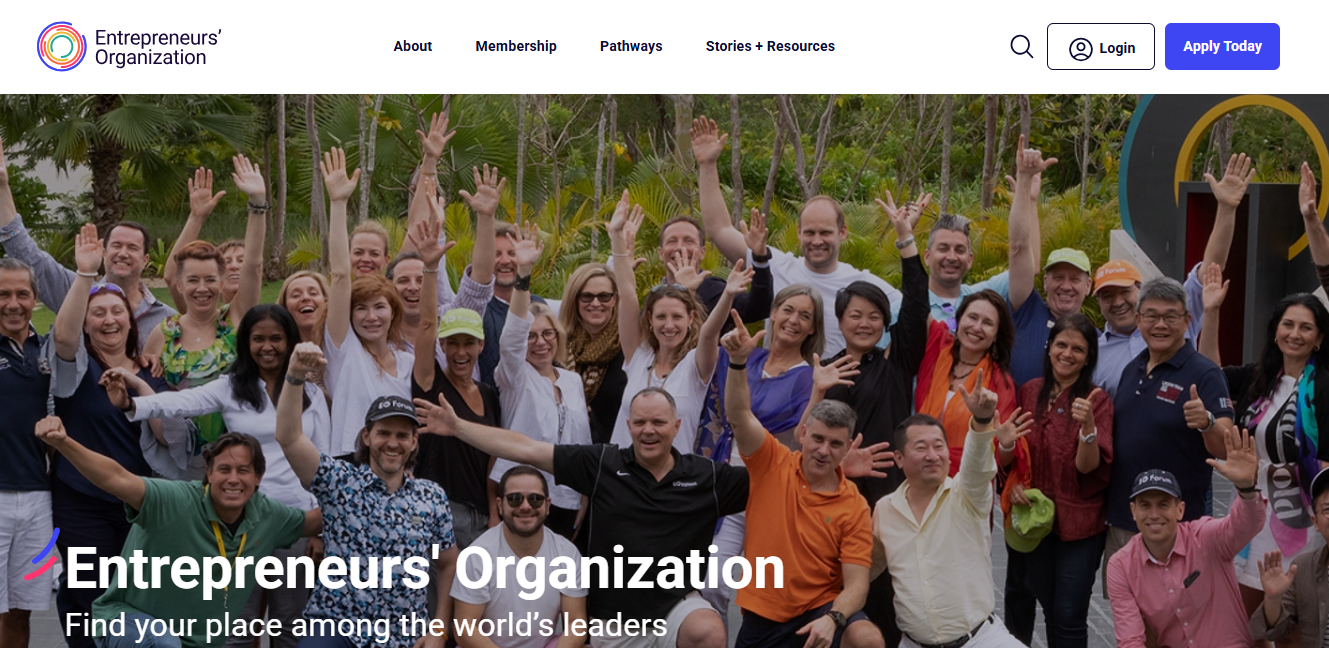
1. Entrepreneurs’ Organization (EO)
EO is a global network of entrepreneurs who run businesses making at least $1 million in annual revenue. It gives business owners a peer group they can trust and learn from through structured forums and events.
Who is it best for:
An established small business owner who wants deep, confidential conversations with other business professionals at a similar stage. This isn’t for early-stage startups or people still validating their idea.
What you get:
- A local chapter and a “forum” (a small group you meet with monthly for structured sessions)
- Access to global and regional events (some virtual, some in-person)
- Learning opportunities like workshops and EO university events
- A highly selective, peer-driven community
Heads-up:
It is not cheap. Membership fees vary by chapter but usually fall in the $3,000–$7,000/year range. And you need to meet the revenue requirement to even apply.
2. Business Networking International (BNI)
BNI is one of the most well-known referral-based networking organizations in the world. You join a local chapter, meet weekly, and help each other generate business leads.
Who is it best for:
Local service providers and small business owners who rely on word-of-mouth and referrals – real estate agents, lawyers, consultants, marketers, etc.
What you get:
- Weekly in-person or virtual meetings
- Structured opportunity to pitch your services and request referrals
- Exclusive seat (no two people in the same profession per chapter)
- Access to a referral tracking system
Heads-up:
BNI can feel very structured and sales-focused. If you are not into weekly commitments or pitching, it might not be a fit. Fees are around $400–$600/year plus local chapter dues.
3. SCORE (Service Corps of Retired Executives)
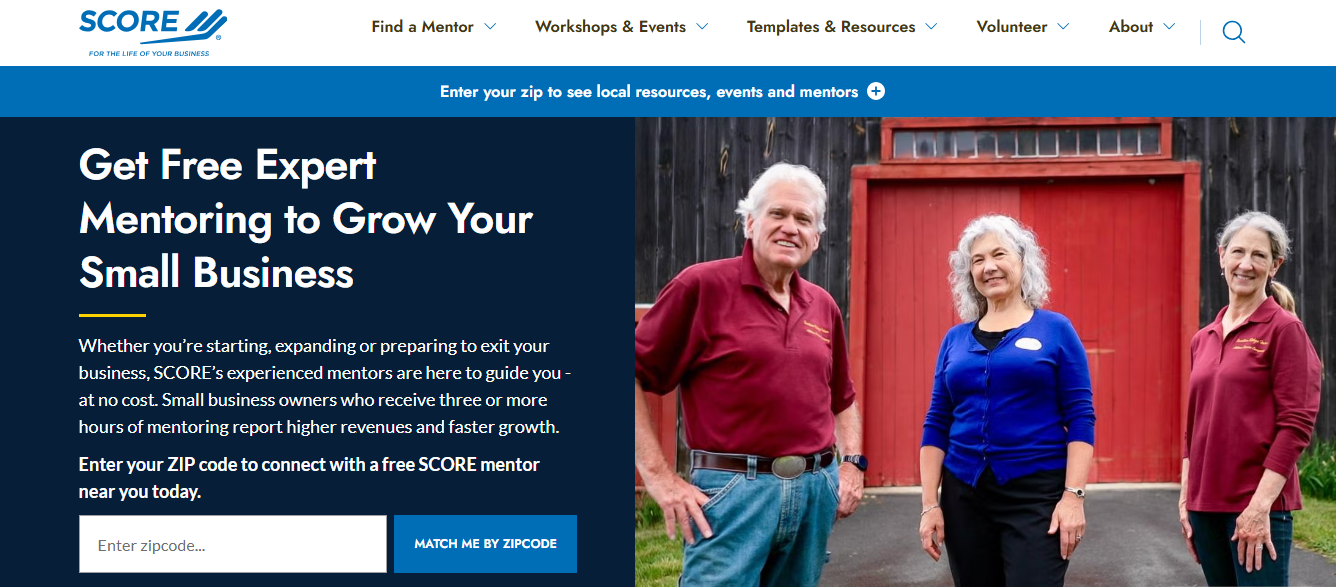
SCORE is a nonprofit small business networking group supported by the U.S. Small Business Administration (SBA). It offers free mentorship, workshops, and networking opportunities to small business owners at every stage. You can get insight that you would normally pay consultants thousands for.
Who is it best for:
Early-stage founders, solo entrepreneurs, or anyone looking for low-cost mentorship and support, especially if you are still learning or testing an idea.
What you get:
- Free 1:1 mentorship from experienced business professionals (many are retired executives)
- Webinars and local workshops
- Local networking events and business meetups
Heads-up:
It is not a peer-based networking group in the traditional sense. You won’t build a “network” through SCORE alone, but you will make connections with mentors and fellow small business owners through local events.
4. Young Entrepreneurs Council (YEC)
YEC is a private, invite-only group for founders under 45 who run businesses making at least $1 million in revenue annually. If you want to grow your personal brand as a founder and get published in big-name outlets, this group can help open those doors.
Who is it best for:
Younger founders who have already achieved traction and want visibility and thought leadership opportunities.
What you get:
- Access to an exclusive online community of vetted entrepreneurs
- Opportunities to publish content in places like Forbes and Inc. (YEC helps place it)
- Virtual and in-person meetups
- A concierge team to help with PR and content
Heads-up:
The $1M/year revenue bar is strict, and the membership cost is around $1,500–$2,000/year. You also need to go through an application and vetting process to get in.
5. Chief
Chief is a private network specifically for women in senior leadership roles – founders, executives, and senior-level decision-makers.
Who is it best for:
Women small business owners and founders who want a peer group of women at a similar level, and a space to talk about leadership and growth without the usual gatekeeping.
What you get:
- Core groups (small, curated peer circles with regular facilitated meetings)
- Access to Chief’s private clubhouse spaces in major cities
- Workshops, speaker events, and professional development sessions
- A vetted network of high-caliber women leaders
Heads-up:
It is selective and pricey. Membership costs around $5,000–$7,000/year, depending on your city and level. But many consider it worth it for the caliber of members and resources.
7 Small Business Networking Events & Meetups To Attend This Year
Here are 7 networking events that are packed with people who actually understand what you are building. Pick one. Show up. See what happens.
1. Dreamforce 2025
📅 October 14–16, 2025 | 📍 San Francisco, CA

What it is: Salesforce’s flagship business‑tech conference with huge attendance from SMBs to enterprises.
Agenda: Over 1,500 sessions, hands‑on demos, AI workshops, keynotes, expo halls, Trail Maps, and structured networking.
Who is it for:
- Small business owners using or evaluating Salesforce
- Founders exploring AI/CRM automation
- Marketing, operations, and tech leads at performance‑oriented SMBs
Where to register: https://www.salesforce.com/dreamforce/
2. America’s SBDC Conference
📅 September 2–5, 2025 | 📍 Orlando, FL
What it is: The national training and networking event by America’s Small Business Development Centers.
Agenda: Nearly 200 hands‑on workshops over 4 days, sessions on funding, growth strategy, counseling techniques, and ecosystem building.
Who is it for:
- Entrepreneurs looking for practical support and mentorship
- SBDC advisors, consultants, and local business support professionals
- Startups and Main‑Street SMBs seeking resources and networking
Where to register: https://nationaltraining.americassbdc.org/
3. TechCrunch Disrupt
📅 October 27–29, 2025 | 📍 San Francisco, CA
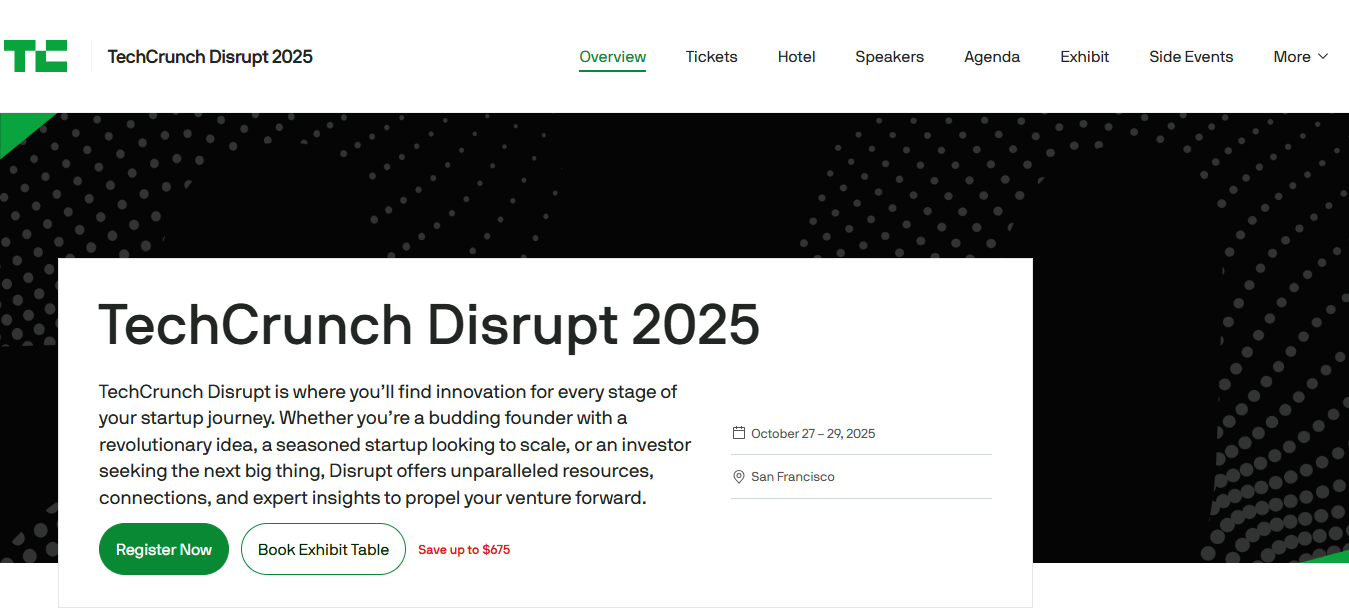
What it is: Technology + startup showcase featuring early‑stage founders, investors, and media on multiple stages.
Agenda: 250+ sessions across multiple themed stages (AI, Builders, Space, Going Public), Startup Battlefield, investor panels, networking events.
Who is it for:
- Tech‑enabled small business founders
- Entrepreneurs seeking capital or partnerships for business success
- Teams focused on SaaS brand marketing who want exposure to the right investors and media circles
Where to register: https://techcrunch.com/events/tc-disrupt-2025/
4. Conscious Capitalism Annual Conference
📅 September 22–24, 2025 | 📍 Dallas, TX
What it is: A summit for mission-driven business leaders committed to purpose-driven business growth.
Agenda: Executive and CEO tracks, general sessions on leadership with purpose, panels about AI, psychological safety, stakeholder orientation.
Who is it for:
- Founders and executives leading ethical or values-based small businesses
- Leaders exploring conscious leadership and stakeholder impact
- CEOs interested in long‑term, sustainable business strategies
Where to register: https://www.consciouscapitalism.org/events
5. The Inc. 5000 Conference
📅 October 22-24, 2025 | 📍 Phoenix, AZ
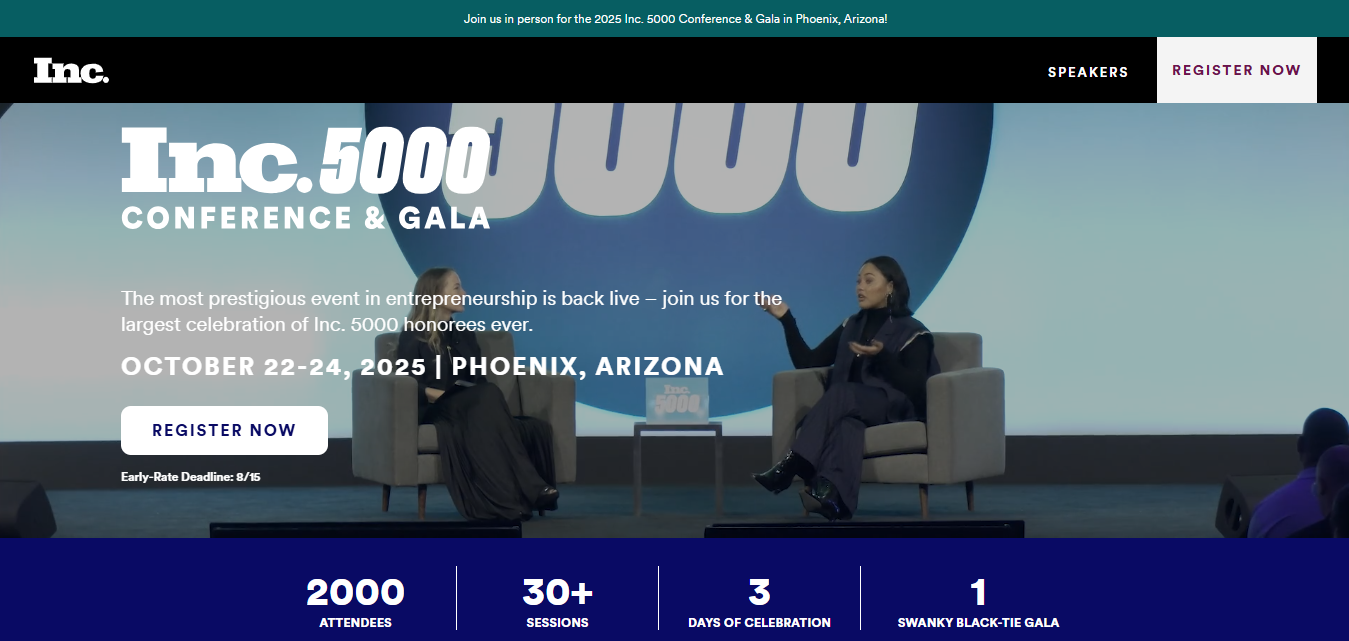
What it is: A gathering of the fastest‑growing private companies in America with keynotes, networking, and a gala celebration.
Agenda: Keynotes by high‑profile speakers (e.g., Dropbox’s Drew Houston), breakout sessions, networking breakfasts/lunches/dinners, and a black‑tie gala.
Who is it for:
- Growth‑focused business owners scaling rapidly
- Emerging companies looking for inspiration or best practices
- Service providers targeting high-growth SMBs
Where to register: https://events.inc.com/2025incconference
6. Forbes Under 30 Summit 2025
📅 Sep 28-Oct 1, 2025 | 📍 Columbus, OH + Virtual
What it is: A four-day summit for young founders and entrepreneurs building early-stage ventures on a fast growth track.
Agenda: Multiple tracks including networking lounges, pitch sessions, masterclasses, fireside chats, branded parties, and mentorship sessions.
Who is it for:
- Founders under 30 or those with young tech-powered ventures
- Early-stage business owners building brands or products
- Creators, innovators, or startup teams seeking high-energy peer connection and visibility
Where to register: https://forbes.com/connect/forbeslive
7. Web Summit 2025
📅 November 10–13, 2025 | 📍 Lisbon, Portugal
What it is: The world’s largest technology conference where ~70,000 attendees gather from global startups, VCs, corporates, and media.
Agenda: 4 days, 15+ conference tracks, over 1,000+ speakers, startup shows (ALPHA, Health, Impact), pitch competitions, investor meetups.
Who is it for:
- Digital-first small business owners and early-stage startups
- Founders exploring global expansion or tech partnerships
- Investors, media, and ecosystem builders looking to connect internationally
Where to register: https://websummit.com/
Conclusion
You have already got what it takes – now it is just rhythm and knowing which small business networking hacks to pull out at the right time. Use them to filter, not to please. Stop chasing connections and start creating a circle that actually gives a damn about what you are building. That is the entire point.
If you are doing the hard part offline, you might as well let your domain carry some weight online too. At ShortDot, we can help you with that. Our .bond extensions speak louder than any pitch and immediately tell people you operate in a space where trust and connection actually mean something.
 Author Bio:Burkhard Berger is the founder of Novum™. He helps innovative B2B companies implement modern SEO strategies to scale their organic traffic to 1,000,000+ visitors per month. Curious about what your true traffic potential is?
Author Bio:Burkhard Berger is the founder of Novum™. He helps innovative B2B companies implement modern SEO strategies to scale their organic traffic to 1,000,000+ visitors per month. Curious about what your true traffic potential is?
Gravatar: vip@novumhq.com
